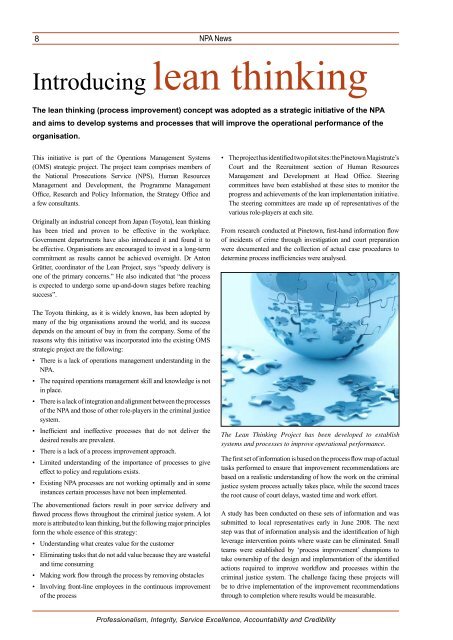Khasho September 2008 - National Prosecuting Authority
Khasho September 2008 - National Prosecuting Authority
Khasho September 2008 - National Prosecuting Authority
- No tags were found...
You also want an ePaper? Increase the reach of your titles
YUMPU automatically turns print PDFs into web optimized ePapers that Google loves.
8NPA NewsIntroducing lean thinkingThe lean thinking (process improvement) concept was adopted as a strategic initiative of the NPAand aims to develop systems and processes that will improve the operational performance of theorganisation.This initiative is part of the Operations Management Systems(OMS) strategic project. The project team comprises members ofthe <strong>National</strong> Prosecutions Service (NPS), Human ResourcesManagement and Development, the Programme ManagementOffice, Research and Policy Information, the Strategy Office anda few consultants.Originally an industrial concept from Japan (Toyota), lean thinkinghas been tried and proven to be effective in the workplace.Government departments have also introduced it and found it tobe effective. Organisations are encouraged to invest in a long-termcommitment as results cannot be achieved overnight. Dr AntonGrütter, coordinator of the Lean Project, says “speedy delivery isone of the primary concerns.” He also indicated that “the processis expected to undergo some up-and-down stages before reachingsuccess”.The Toyota thinking, as it is widely known, has been adopted bymany of the big organisations around the world, and its successdepends on the amount of buy in from the company. Some of thereasons why this initiative was incorporated into the existing OMSstrategic project are the following:• There is a lack of operations management understanding in theNPA.• The required operations management skill and knowledge is notin place.• There is a lack of integration and alignment between the processesof the NPA and those of other role-players in the criminal justicesystem.• Inefficient and ineffective processes that do not deliver thedesired results are prevalent.• There is a lack of a process improvement approach.• Limited understanding of the importance of processes to giveeffect to policy and regulations exists.• Existing NPA processes are not working optimally and in someinstances certain processes have not been implemented.The abovementioned factors result in poor service delivery andflawed process flows throughout the criminal justice system. A lotmore is attributed to lean thinking, but the following major principlesform the whole essence of this strategy:• Understanding what creates value for the customer• Eliminating tasks that do not add value because they are wastefuland time consuming• Making work flow through the process by removing obstacles• Involving front-line employees in the continuous improvementof the process• The project has identified two pilot sites: the Pinetown Magistrate’sCourt and the Recruitment section of Human ResourcesManagement and Development at Head Office. Steeringcommittees have been established at these sites to monitor theprogress and achievements of the lean implementation initiative.The steering committees are made up of representatives of thevarious role-players at each site.From research conducted at Pinetown, first-hand information flowof incidents of crime through investigation and court preparationwere documented and the collection of actual case procedures todetermine process inefficiencies were analysed.The Lean Thinking Project has been developed to establishsystems and processes to improve operational performance.The first set of information is based on the process flow map of actualtasks performed to ensure that improvement recommendations arebased on a realistic understanding of how the work on the criminaljustice system process actually takes place, while the second tracesthe root cause of court delays, wasted time and work effort.A study has been conducted on these sets of information and wassubmitted to local representatives early in June <strong>2008</strong>. The nextstep was that of information analysis and the identification of highleverage intervention points where waste can be eliminated. Smallteams were established by ‘process improvement’ champions totake ownership of the design and implementation of the identifiedactions required to improve workflow and processes within thecriminal justice system. The challenge facing these projects willbe to drive implementation of the improvement recommendationsthrough to completion where results would be measurable.Professionalism, Integrity, Service Excellence, Accountability and Credibility

















